After a long and gloriously pollen-free winter, it’s spring again, and for many people with spring allergies, that means the dreaded return of itchy eyes, sneezing, congestion, coughing, and that general foggy feeling that comes with allergic rhinitis due to the release of tree pollen. The itchy, swollen feeling can definitely put a damper on the enjoyment of a beautiful spring, but the side effects of antihistamines and decongestants can be almost as unpleasant.
Some people have allergies so severe that they truly do need medication, but if you prefer a non-pharmaceutical approach, start with the basics: Eat a healthful diet full of anti-inflammatory fruits and vegetables, get enough sleep, avoid junk food, get regular exercise, and generally take care of yourself. This is how you support your immune system, so it has a fighting chance at fighting your allergic response. Make allergy season self-care season. Also try these natural methods for reducing the symptoms of spring allergies:
Mechanically Separate Yourself From Pollen
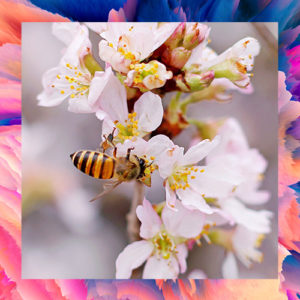 At the most basic level, separating yourself from pollen can make a big difference in the frequency and severity of your seasonal allergy symptoms. You can do this both internally and externally. Internally, you can literally flush pollen out of your nasal passages, which hold on to pollen. If you clear out the pollen right after exposure (like whenever you go outside), you could clear it before your body reacts to it. My favorite method is a neti pot. Dissolve 1 teaspoon natural (non-iodized) sea salt into warm filtered or distilled water, then use the neti pot to flush out your nasal passages. If you don’t have a neti pot or don’t want to use one, you can get a similar effect with a simple saline-solution nasal spray.
At the most basic level, separating yourself from pollen can make a big difference in the frequency and severity of your seasonal allergy symptoms. You can do this both internally and externally. Internally, you can literally flush pollen out of your nasal passages, which hold on to pollen. If you clear out the pollen right after exposure (like whenever you go outside), you could clear it before your body reacts to it. My favorite method is a neti pot. Dissolve 1 teaspoon natural (non-iodized) sea salt into warm filtered or distilled water, then use the neti pot to flush out your nasal passages. If you don’t have a neti pot or don’t want to use one, you can get a similar effect with a simple saline-solution nasal spray.
For external pollen control, during allergy season, wash your hands every time you come inside. Leave your shoes at the door, wash your clothes often, and vacuum often, to keep your indoor environment as pollen-free as possible. You can’t get it all, but keeping as much as you can out of the house truly can help. Another effective strategy is to keep your windows shut during the peak of the season. This can be a sacrifice for those of us who love fresh air in the house, but it canl significantly reduce your symptoms.
Stay Hydrated
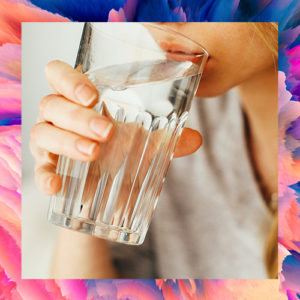 Now let’s go even more internal. Allergies are basically an immune mistake—your body misinterprets harmless pollen as a threat and reacts by releasing histamines and other chemicals to attack the pollen. Ideally, our bodies shouldn’t do this, but one of the things that can hinder all systems of the body, making everything have to work harder (not smarter), is dehydration. It’s amazing what we expect our bodies to do when dehydrated, but simply drinking more water—about half your body weight in ounces daily—can help all your organs work better and ease the stress on your systems, including your immune system, so it can get smarter about its reactivities. Dehydration also increases inflammation, which can worsen allergy symptoms, and being properly hydrated will thin nasal secretions so they drain more quickly, which means you may feel less congested.
Now let’s go even more internal. Allergies are basically an immune mistake—your body misinterprets harmless pollen as a threat and reacts by releasing histamines and other chemicals to attack the pollen. Ideally, our bodies shouldn’t do this, but one of the things that can hinder all systems of the body, making everything have to work harder (not smarter), is dehydration. It’s amazing what we expect our bodies to do when dehydrated, but simply drinking more water—about half your body weight in ounces daily—can help all your organs work better and ease the stress on your systems, including your immune system, so it can get smarter about its reactivities. Dehydration also increases inflammation, which can worsen allergy symptoms, and being properly hydrated will thin nasal secretions so they drain more quickly, which means you may feel less congested.
Take Butterbur
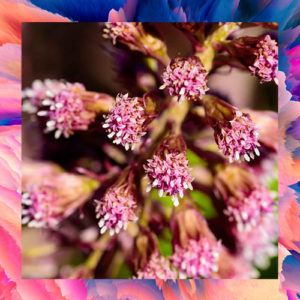 An herbal remedy proven to reduce nasal allergy symptoms is butterbur, a shrub native to Europe, with large leaves that were traditionally used to wrap butter in warm weather, to keep it cool. It just so happens butterbur is a natural antihistamine and also inhibits leukotriene receptors. Leukotriene is one of the chemicals the body produces that causes allergy symptoms and inflammation, so blocking the receptors keeps it from causing symptoms. Studies have shown that butterbur is just as effective in reducing nasal allergy symptoms as the allergy medicines fexofenadine and montelukast, without the troubling side effects. Butterbur doesn’t seem to be as effective on asthma or skin allergy symptoms, but if allergic rhinitis is your issue, butterbur supplements may be your answer. (It has also been shown to help with migraines.)
An herbal remedy proven to reduce nasal allergy symptoms is butterbur, a shrub native to Europe, with large leaves that were traditionally used to wrap butter in warm weather, to keep it cool. It just so happens butterbur is a natural antihistamine and also inhibits leukotriene receptors. Leukotriene is one of the chemicals the body produces that causes allergy symptoms and inflammation, so blocking the receptors keeps it from causing symptoms. Studies have shown that butterbur is just as effective in reducing nasal allergy symptoms as the allergy medicines fexofenadine and montelukast, without the troubling side effects. Butterbur doesn’t seem to be as effective on asthma or skin allergy symptoms, but if allergic rhinitis is your issue, butterbur supplements may be your answer. (It has also been shown to help with migraines.)
Try Acupuncture
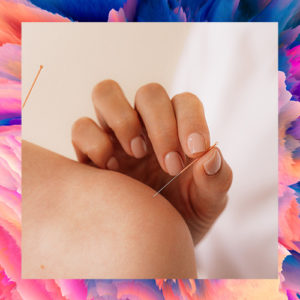 You may know I am a big advocate of Chinese medicine, and for good reason. When it comes to seasonal allergies, research has shown that acupuncture is more effective than antihistamines for allergic rhinitis. Acupuncture can actually influence the inflammatory cytokines produced by the allergic response. I recommend consulting with an experienced and licensed acupuncturist about your allergy symptoms. I’ve seen dramatic results for many people who use acupuncture for the relief of seasonal allergy symptoms.
You may know I am a big advocate of Chinese medicine, and for good reason. When it comes to seasonal allergies, research has shown that acupuncture is more effective than antihistamines for allergic rhinitis. Acupuncture can actually influence the inflammatory cytokines produced by the allergic response. I recommend consulting with an experienced and licensed acupuncturist about your allergy symptoms. I’ve seen dramatic results for many people who use acupuncture for the relief of seasonal allergy symptoms.
What Might Work: Local Honey
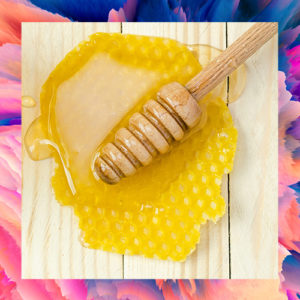 You may have heard that eating local honey can help relieve allergy symptoms, but the research on this is not definitive. Theoretically, it sounds sensible—if local honey exposes you to small amounts of local pollen, maybe you would develop a tolerance? However, spring allergies are more likely to be to tree pollen, not flower pollen, which is what bees are gathering. Honey may have very small amounts of tree pollen peripherally, but probably not enough to make any difference. Several studies have not showed that local honey makes any difference at all in allergy symptoms.
You may have heard that eating local honey can help relieve allergy symptoms, but the research on this is not definitive. Theoretically, it sounds sensible—if local honey exposes you to small amounts of local pollen, maybe you would develop a tolerance? However, spring allergies are more likely to be to tree pollen, not flower pollen, which is what bees are gathering. Honey may have very small amounts of tree pollen peripherally, but probably not enough to make any difference. Several studies have not showed that local honey makes any difference at all in allergy symptoms.
However, these studies were fairly short-term. One study did look at the longer-term effects of a high dose of local honey and showed improvements in allergic rhinitis. This may be because tolerance takes longer to develop. The dosage was high, though—a gram per kg of body weight. That means if you weigh 150 pounds, you would need to eat almost 2.5 ounces of local honey (approximately 3 tablespoons) every day for an extended period, and the effect stops when you stop eating the honey. If you love honey and you eat it anyway, it may help to stick to local varieties of raw honey, but I wouldn’t depend on it for symptom relief. That being said, honey does have anti-inflammatory properties and does seem to be an effective remedy for that throat tickle that can cause coughing, so it might help to soothe allergy symptoms, even if it may not necessarily prevent them.
Seasonal allergies may always be with us, but create a foundation of vibrant health and you may minimize the effect—or even eliminate your seasonal allergies over time.
SOURCES:
https://doi.org/10.1111/j.1365-2222.2004.1903.x
https://doi.org/10.1111/j.1365-2222.2004.1903.x
https://www.ncbi.nlm.nih.gov/pmc/articles/PMC4479426/
https://acaai.org/resources/connect/ask-allergist/will-honey-relieve-my-seasonal-allergies
